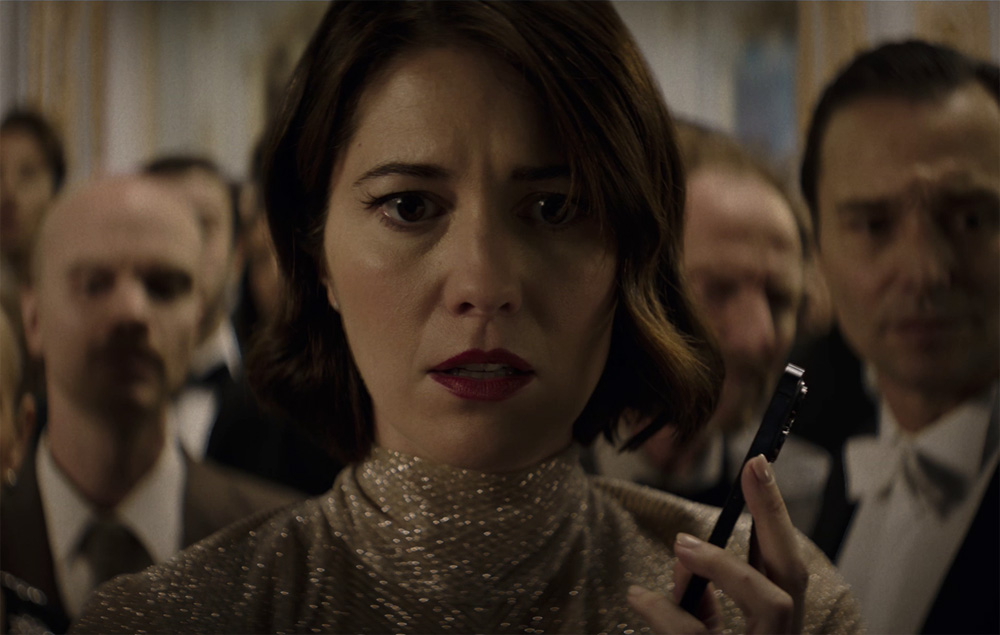It isn’t difficult to imagine at least a few of the outlandish story pitches thrown at Laura (Mary Elizabeth Winstead) in the opening minutes of “Rich Flu” came directly from the pinboard of director Galder Gatztelu-Urrutia and co-writers David Desola and Pedro Rivero before the trio thought they weren’t taking any further, and it’s their genius that the first the production executive hears serves to give shape to the entire premise of their follow-up to “The Platform” and its sequel to quickly rid itself of more prolonged exposition. As an overcaffeinated screenwriter imagines a society in which all diseases are cured, making overpopulation an issue that is dealt with through the use of an algorithm that determines those who contribute the least, there is no doubt that after Rivero, Desola and Gatztelu-Urrutia are considering the haves and have-nots as they did in a prison for their previous Netflix hit, only expanding the scope to involve every country on earth when a mysterious virus seems to be wiping out the wealthy and while it’s probably for the best not to think too hard about how a biologically communicable disease could be connected to financial currency, there is some fun to be had in turning society upside down.
Laura’s own world is thrown into chaos not by news that the Pope has died, among other prominent figures, soon after leaving the hotel where she was taking meetings before the premiere of a new film, but upon discovering the promotion she wanted at the global conglomerate her studio is a part of went to someone else. Already in the midst of a separation from her husband Tony (Rafe Spall) who is upset she won’t relocate with him to Barcelona, given the custody of their 16-year-old daughter Anna, the news couldn’t come at a worse time, but she is offered what appears to be a consolation prize by her company’s eccentric CEO Sebastian Snail (Timothy Spall) with an invite to join him in an undisclosed location for a job offer in another division of the company. Finding herself in what looks to be Siberia, greeted by a dog sled, Laura is among a handful of employees offered a ridiculous amount of money along with a copy of Henri Thoreau’s “Walden” under a new philanthropic effort that she doesn’t ask any questions about, seeing how a colleague of hers is cut to size when he does.
The first frenzied half of “Rich Flu” is lightning quick, ostensibly to mirror Laura’s jet-set lifestyle that prevents her from being at her daughter’s birthday when she’s constantly placing her career over her personal life and the world at large, which doesn’t stop as the strange pandemic takes hold with nine of Forbes’ top 400 richest people dying within days and symptoms only showing up in their teeth, which become unnaturally white. But eventually, things slow down once Laura learns that the fortune she’s been handed by Sebastian has made her susceptible to the virus was part of a divestiture to maintain his own health and the film begins to run into the issues once faced by Andrew Niccol, the last notable filmmaker to devote himself so fully to high-concept dystopian ideas.
A little more “In Time” than “Gattaca,” “Rich Flu” has a dynamic performance from Winstead to carry the film, able to handle its inherent black comedy and convincingly having the toughness required of a trek that spans London to Tanzania, but the world around her isn’t as well thought out. Cash may be largely unwanted but still can pay for flights out of contagion zones — admittedly resulting in one of the film’s most entertaining scenes where millionaires viciously squabble on a golf course full of helicopters about who can get on — and how the virus travels and how people respond to it in any other way than fear remains hazy throughout, the kind of small irritating inconsistencies that can get in the way of a good time.
Still, Gatztelu-Urrutia proves that “The Platform” wasn’t a fluke in terms of taking a big swing thematically that he could pull off on a practical level when “Rich Flu” plays big, zipping around from one major set-piece to another as Laura moves between the mad dash of escaping a metropolis to the middle of a refugee camp, tied together by a trip across the ocean with her mother (Lorraine Bracco) in tow. Arriving at a relatively simple conclusion that wealth corrupts, all the energy that it took to get there may surprise, but Gatztelu-Urrutia’s own display of decadence proves its point with how exciting and infectious that can be.
“Rich Flu” does not yet have U.S. distribution.




